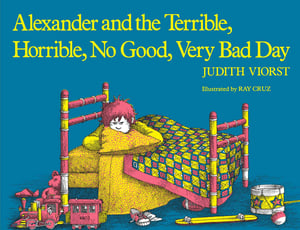In 1972, Judith Viorst wrote a book called “Alexander and the Terrible, Horrible, No Good, Very Bad Day”. In it, a boy keeps having lots of problems, and decides to move to Australia. (Of course, in the Australian and New Zealand versions of the book, he decides to move somewhere else!)
During the course of the day, many bad things happen to Alexander. Some are unfortunate, others unfair, and some he brings upon himself, but Alexander resents them all equally. Reasoning that things would be different somewhere else, Alexander states that he will move to Australia (or Timbuktu in the Australian version).
Of course, Alexander never actually went there. But if he had, he likely would have had bad days there too. After all, no matter where you go, there you are. (Which was pretty much the whole point of the book.)

Today, you may be facing some terrible, horrible, no good, very bad things. Depending on where you live, you may be facing disease, economic uncertainty, isolation, panic, or all of the above. And it is incredibly tempting to seek alternatives – even “alternative facts” – to make the terrible things go away.
I myself am reminded of my first time boarding up a house for an oncoming hurricane. There was a considerable period of time that I spent basically wishing I wouldn’t have to do anything. The hurricane would turn. It wouldn’t be too intense. Right?
When I was younger, I often sought clever ways to bring life into my control, to solve problems quickly and easily. But even though I developed many methods for solving things, I eventually came to understand that my quest to solve things was just a variation on Alexander’s desire to move to Australia (or Timbuktu), so he could be in a place where terrible, horrible, no good, very bad things wouldn’t happen.
I thought that if only I could get good enough at changing myself, if only I was productive enough, healthy enough, creative enough… then everything would be under control and I would live happily ever after.
But as much as I hated going through the many hurricanes that happened in my area over the years, they taught me a valuable lesson:
Looking for an “out” only makes things worse!
Each time hurricane season came around again, the same thing would happen. I’d tell myself the hurricane would turn. That it wasn’t time yet. And I’d agonize sometimes for days about whether to go somewhere else or ride it out.

And then, at some point, I would throw up my hands and go “screw this”, finally making a decision about what to do.
And it always felt so much better.
Just admitting to myself that something needed to be done, admitting that I could not shrug it off, it made me feel better every single time.
To the point that it finally began to sink into my thick skull outside of hurricane season.
I began to see the pattern everywhere, not just in emergencies. Heck, almost every kind of procrastination problem, confidence problem, self-esteem problem, you name it…
They’re all rooted in an attempt to wish a problem away. To find a magical place like Australia (or Timbuktu) where the problem won’t ever hurt us any more.
And the problem with this quest isn’t that the magical places we’re looking for don’t exist. (After all, Australia and Timbuktu do actually exist!)
No, the real problem is that in life, there is no certainty, no absolutes. No matter how much we may wish to avoid the terrrible, horrible, no good very bad things, we cannot with 100% certainty guarantee that they will never happen.
And so, it is not our desire to solve or avoid our problems that trip us up. Rather, it is the underlying quest for certainty and control that makes us suffer.
Luckily…
There is an antidote.
It’s just that you might not care for the taste of it.

During my first hurricane boarding up a house, our roof became damaged, and we hired a roofer to fix it. He took our money, did the first part of the job, and then promptly disappeared.
For one.
Whole.
Year!
We called him and called him, and he kept giving us excuses and stories. My wife and I worried ourselves sick, staying up late at night and not getting enough sleep, while this guy kept our money and didn’t do any more of the work.
During one late night conversation, right around the one year mark, I came to a realization:
We weren’t acting, because we were afraid that say, taking him to court would result in say, him not fixing our roof, and us being out the money.
And yet…
That was the situation we were already in!
He already had our money. He already wasn’t fixing the roof. We were already in the situation we feared would come to pass…
We were just acting as if we weren’t.
And once I understood that, I was free to act.

I called the roofer at home in the middle of the night, that very night, and when he answered I began singing “Happy Anniversary” to the tune of the William Tell Overture (aka the old “Lone Ranger” theme). When he wanted to know what the heck was going on, I cackled, telling him that it was now the one year anniversary of him being with our money, and that I hoped he and our money were very happy together.
(Long story short: he finished fixing our roof pretty quick after that. Probably thought I was crazy and it’d be best not to tick me off.)
But I digress. The real point of the story is this:
If you are paralyzed with uncertainty. If you are afraid that taking action against your fear will make it come to pass. If you believe that you need to avoid, if at all possible, any chance of the terrible, horrible, no good, very bad things from happening…
That is the time to admit it.
To admit that you do not know. That you cannot tell. That things are, in fact, out of your control.
And in so doing, you will realize a paradoxical thing, that can only be experienced and never truly explained.
By admitting the truth you are trying to avoid, by admitting that you are not, no, can not be certain the thing can be avoided…
Your mind returns to a place of certainty!
And there is a calm, a peace in that, that all your attempts at avoidance will never, ever match.
And sometimes, you’ll even gain a sudden insight into how your problem might be solved in some out-of-the-box way… like calling up your roofer and singing “Happy Anniversary”!

Now, I’m not saying this is easy to do.
In fact, it’s actually pretty hard.
Nearly a decade and a half later, I still freeze up at hurricanes and other natural disasters. Because I have to remember to admit to what I’m not admitting to. And I have to notice that there’s something I’m not admitting to in the first place!
The problem is that our brains think that if we don’t admit to the thing, it somehow won’t be real. Like the possible loss that’s coming at us, full steam ahead, will somehow not be real, if we don’t admit it’s real.
And we start thinking, “well, maybe it won’t be so bad”, or “maybe it won’t affect me,” or maybe “someone else will fix it”.
But what if those things aren’t true?
The truth is: you don’t know.
Maybe it will be bad. Maybe it won’t. Maybe it’ll affect you. Maybe it won’t. If you can’t be certain, then at least be certain of your uncertainty!
If you can at least admit to not-knowing, then you can make decisions based on that. You can hedge your bets, consider trade-offs, make actual value judgments.
Things you can’t do, while you’re wishing reality weren’t happening.
Please believe me: I’m not writing this to tell you what you should be doing right now. I can’t even imagine what you’re going through, let alone offer practical advice.
But there is one thing I do know, one thing I can say:

Whatever the truth is, admit it!
Because if you stop hoping the bad thing will go away, you can start actually living again.
No matter what the bad thing is.
In the last decade or so, I’ve had to stare down more than one monster of this kind. Health scares, for me and my wife. Financial challenges. Fears of age and death and meaninglessness.
These things are beyond our power to truly control or even truly be certain about, except in one thing:
We can be certain we are uncertain.
And we can hopefully come to understand that “wishing”…
Is just another word for “fear and suffering”.
Because when you’re wishing, you’re dividing your mind against itself. You’re worrying that the bad thing is coming, and at the same time trying to make it not-be-so.
And this division literally hurts your brain, every time you do it. You feel the dissonance, the “nhghrrh” of grinding mental gears, even as you look for the escape, the miracle cure, the excuse, that will make it go away.
Pro tip: it won’t go away.
Not ever.
But when you truly understand that. When you stop trying to make it go away.
Then you become free.
Free of suffering.
And free to act.

Because when your mind is undivided, you can face anything.
And the terrible, horrible, no good, very bad things… turn out to not be so scary after all.
Be well!
–PJ
P.S. When I say “not so scary” I don’t mean to say that disease and death aren’t awful, or that they will somehow become awesome and amazing when you admit to your uncertainty around them. (They won’t!) But the constant oscillation of your mind about them can only make them worse… and I speak from numerous painful (terrible, horrible, no good, very bad) experiences on this. “Bad” isn’t good, but it’s better than “Bad and scary and worried and stressed and freaking out”… all of which I’ve had my own share of in the last week or so.






